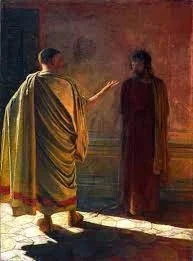What is Truth?
Among the sixteen documents of the Second Vatican Council is the Decree on Ecumenism which is called in Latin Unitatis Redentegratio. The modern search for unity of faith and life among Christians is commonly reckoned to have begun in meetings and groups such as the first Lambeth Conference, held in 1867, the World Student Christian Federation, started in 1895, and the World Missionary Conference at Edinburgh, held in 1910. But while Orthodox and Protestant Christians engaged in conversations with each other, the Catholic Church largely stood apart from this ecumenical movement until the promulgation of Unitatis Redentegratio in 1964.
To understand what the Catholic Church means by ecumenism or the search for the restoration of full, visible communion among all who confess that Jesus Christ is Lord, I suggest that you read both Unitatis Redentegratio and Ut Unum Sint, an encyclical letter published by Pope Saint John Paul II in 1995. Both of these texts teach that Christian unity cannot be based on anything other than the truth revealed by God for the salvation of the human race, and understanding that insistence on the acceptance of revealed truth in turn requires one to understand what truth is - the very thing that stumped Pontius Pilate.
Put most simply, truth is found when my mind agrees with reality, when my thoughts accurately correspond to the reality of the world outside of my mind. And in the case of the Gospel, truth is found when I abide in the Word of God, when I trust God who reveals Himself, and when I believe what He reveals because He can neither deceive nor be deceived. “If you abide in my word, you are truly my disciples, and you will know the truth, and the truth will set you free.” (John 8:31-32)
I have pondered these things lately because the Catholic Church in Germany (and in many other places) has arrived at a moment of crisis and decision over what God has revealed to us about ecclesial order, human nature, and the sacramental economy of salvation. And what is at stake in the debates over the disputed questions is nothing other than the existence of revealed truth and the capacity of the human mind to know and assent to the truth which is revealed. In recent weeks many bishops in Germany and elsewhere (including two cardinals) have called for the Church to change her teaching on the sacraments of Orders and Matrimony and on same sex romantic friendships.
Implicit in these requests for a change in the Church’s teaching is the belief that all of these doctrines are like the speed limit imposed on roads by governments at the appropriate levels, and any government which imposes a speed limit has the power to change that limit for a just cause. In the case of the German Synodal Way and similar agitations, the Church is thought by the revisionists to have the power to change doctrines that it created, and the fact that the Church won’t change doctrine to accommodate these demands is simply attributed to bad will, to stubbornness, to ignorance, to fear, or to a lack of charity. But if the disputed doctrines are not like speed limits, if they are instead like the laws of physics which do not depend upon our desires but instead disclose themselves from the very nature of the cosmos, then the Church can no more alter her teaching on who can be ordained or married than the the speed of light can be changed by wishing it were so.
“Pilate said to him, ‘What is truth?’” (John 18:38) The Church is not the master of the Gospel; she is merely the servant and steward of “the faith that was once for all delivered to the saints.” (Jude 1:3) What the German Synodal Way is asking for in the alteration of the Church’s teaching on the sacraments and sexuality is not possible, and that means that those Catholics who are convinced the Church is teaching falsehood about these questions are no longer in full, visible communion with the Catholic Church.
The ecumenical movement began with the search for overcoming divisions of doctrine and discipline first among Protestants of many kinds, then between Protestants and Orthodox, and finally among all Christians, including Catholics. That ecumenical movement was irretrievably changed by the Second Vatican Council and by subsequent Catholic teaching on Christian unity, but now we have arrived at the very strange pass of needing first to find full, visible communion of faith among those who are already Catholics, including not a few bishops and even some cardinals. And where shall we look for such unity? We must look to the Lord Jesus.
“I am the Way, the Truth, and the Life. No one comes to the Father except through me.” (John 14:6)

